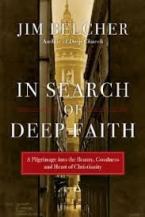It is always exciting to reach this point in the year, to look back, and to consider God’s faithfulness! As we head into summer, we always have high hopes for catching up on our reading and reflecting. So, no guilt if you don’t look at things below, but here are things that caught my eye recently:
 A few weeks ago I finished reading a wonderful book In Search of Deep Faith: A Pilgrimage into the Beauty, Goodness, and Heart of Christianity by Jim Belcher, who I learned in the meantime has accepted a new job as President of Providence Christian College in Pasadena, California. His new book has received recognition as Christianity Today’s “Best of the Best” book for its 2013 Leadership Journal awards.
A few weeks ago I finished reading a wonderful book In Search of Deep Faith: A Pilgrimage into the Beauty, Goodness, and Heart of Christianity by Jim Belcher, who I learned in the meantime has accepted a new job as President of Providence Christian College in Pasadena, California. His new book has received recognition as Christianity Today’s “Best of the Best” book for its 2013 Leadership Journal awards.
Here is a thoughtful post by Ontario, CA school head Paul Marcus about Christian schools being judged by the behavior of their students – Not Angel Factories
 I am just finishing Michael Frost’s new book, Incarnate: The Body of Christ in an Age of Disengagement. This is an excellent book for Christian school leaders to read to help them in their task of cultural discernment. Not only does he point out ways that our culture sucks us into excoriation/escapism, but suggests how Christians might better love God by loving neighbors. This book provides excellent guidance for educators who seek to live out an incarnated life with students.
I am just finishing Michael Frost’s new book, Incarnate: The Body of Christ in an Age of Disengagement. This is an excellent book for Christian school leaders to read to help them in their task of cultural discernment. Not only does he point out ways that our culture sucks us into excoriation/escapism, but suggests how Christians might better love God by loving neighbors. This book provides excellent guidance for educators who seek to live out an incarnated life with students.
Good videos on vocation/work from Tim Keller:
Work defined – “arranging of raw material for the flourishing of everyone”
Why Work Matters – A Christian understanding of why your work matters and why God matters to your work
On the lighter side: Video – How to Write a Worship Song( in 5 minutes!)
Fantastic collection of science resources for congregations and educator at The Ministry Theorem.
A very helpful video companion (and great charts also!) to the book Origins: Christian Perspectives on Creation, Evolution, and Intelligent Design by Calvin professors Deborah and Loren Haarsma – available here.
Our Children Should Not Have to Choose Between Science and Faith by Tim Stafford
A follow-up to Stafford: Why You Might Have to Choose Between Science and Faith
What do we really tell our boys by saying “Be a man!”? This video trailer “The Mask You Live In” questions assumptions. Warning: Language is realistic, but may be offensive)
What will education look like in the future? Helpful infographic from KnowledgeWorks.
The study habits of today’s students: interesting infographic.
Excellent thoughts, research and resources on the use of lecture from Grant Wiggins.
Quote: “The observer of beauty always gets a passion to share that beauty with others. You always talk about what you love.” Tim Keller
How would you define beautiful work?
One pastor’s observations about the 5 Traits of Kids Who Keep Following Christ As Adults.
“Unsung Hero” video – the difference one life can make in the world – very touching!
Inspiring creativity in schools – relationship between chaos and creativity.
Buck Institute’s PBL project search tool – 500 projects!
This is a truly amazing video – Wonder! TED talk on the hidden mysteries of our world.
Thanks for reading Nurturing Faith again this year! CSI will be discontinuing Nurturing Faith and so this will conclude posts on this site, although previous posts will be able to be accessed at this location. If you have enjoyed reading Nurturing Faith, I will continue blogging at the following sites:
danbeerens.com – my personal website
CACE – as a CACE fellow, I will blog periodically on this site.
SCS Community – as a convener of these conferences, I will also be blogging on this site.
Blessings on your work and let’s continue the dialogue!

